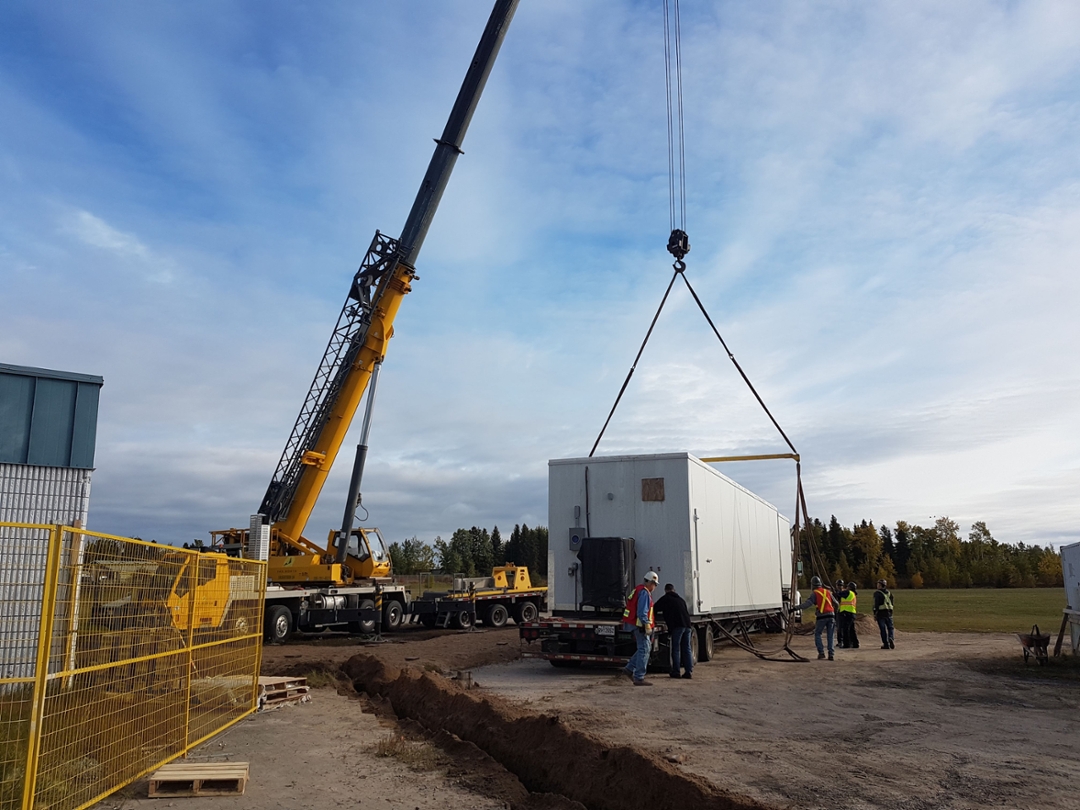Modular farm changing learning at La Loche high school
A northern community has received a boost with the delivery of the first-ever modular farm located at a high school in Canada.
By Nicole Betker, Education Communications
Dene High School in La Loche, SK, established the farm after receiving a $250,000 PC© Children’s Charity Innovation Grant. The grant provided additional support from the charity to continue to help sustain the school’s breakfast and lunch program.
With access to fresh food being an issue for the region, a greenhouse became a dream of students and staff to help sustain the current program in the remote community. Senior science teacher and University of Saskatchewan (U of S) College of Education alumna Dakota de Caux (BSc(Hons)’14, BEd’16) was an immediate supporter and contributor to the idea.
“When the financial support from the government was drastically reduced, the greenhouse and many other dreams had to be scratched from the plans,” said de Caux, who is also a current U of S student in the land-based Educational Foundations master’s program.
“In the fall of 2017, we were approached by representatives from PC© Children’s Charity because they wanted to continue supporting our meal programs for students, enrich our educational opportunities, and turn our dream of having a greenhouse into a reality. When they visited our school in October of 2017, [they] presented an opportunity to grow a large amount of produce for twelve months of the year using state of the art technology.”
The modular farm arrived on Sept. 17 and will drastically change the school’s meal program and educational opportunities for students in environmental sustainability, health and food security. Housed in a container resembling a train car and built for a northern environment, the unit contains a workspace for planting and harvesting and four vertical walls of produce, which are sustained by automated lighting, heating and watering systems.
The system uses 95 per cent less water than a typical farm and can produce up to 1,000 heads of lettuce or 6,000 plum tomatoes per week. Once the La Loche farm is running, the first crops will consist of romaine lettuce, kale, spinach, baby lettuce, basil, oregano, peppermint and chives. Expansion will occur into tomatoes, peppers, cucumbers and strawberries once the students are comfortable working with the crops.
“Access to fresh produce is hindered by climate, transportation and consumer costs in this community that experiences high rates of poverty and unemployment,” said de Caux. “The unavailability and high costs of healthy foods combined with the continued impacts of colonization have resulted in high rates of nutrition-related health concerns, including Type 2 diabetes, within our community. This project gives us the opportunity to become more self-sufficient, lower our food costs and provide more nutritious meals for our students.”
In May 2018, de Caux led a group of Dene High School students on a trip to Toronto for training and experience in how to operate a modular farm, to be sure that the school was prepared for the work of growing the produce. Teachers nominated students and through an interview process, five were chosen to be the primary farmers. In Toronto, the students took a cooking class, had a discussion with a dietician and took lessons in the equipment and technology of the farm.
De Caux expects the farm to be incorporated into a variety of educational programming and provide opportunities for entrepreneurial initiatives within the school, on top of giving the school an opportunity to share nutritious produce through knowledge gained by the students.
But the learning opportunities haven’t just been for the students. De Caux and fellow teachers and administrators at the school have expanded their knowledge thanks to the grant and modular farm. De Caux describes the experience as rewarding for an educator and has felt a new sense of passion, hope and desire for the new innovative educational opportunities.
“Education is much more than curriculum documents, textbooks, assignments, and electronic devices,” said de Caux. “If educators strive to make learning relevant to students and take it outside of a traditional classroom, an amazing amount of enthusiasm, passion, and excitement will result.”
De Caux went on to say that students who are empowered will show strong leadership skills.
“In a world faced with environmental disasters and devastations, we need to empower our students and help them develop the skills necessary to address issues of sustainability through hands-on and authentic learning experiences. When they are provided with the proper environment, support, and encouragement, our young people have remarkable leadership skills, creative recommendations for improvement, and the desire to be part of the change.”

